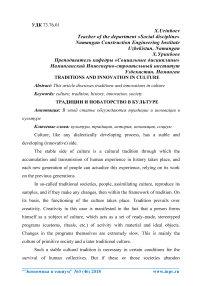Traditions and innovation in culture
Автор: Urinboev X.
Журнал: Экономика и социум @ekonomika-socium
Статья в выпуске: 3 (46), 2018 года.
Бесплатный доступ
This article discusses traditions and innovations in culture
Culture, tradition, history, innovation, society
Короткий адрес: https://sciup.org/140236414
IDR: 140236414
Текст научной статьи Traditions and innovation in culture
Culture, like any dialectically developing process, has a stable and developing (innovative) side.
The stable side of culture is a cultural tradition through which the accumulation and transmission of human experience in history takes place, and each new generation of people can actualize this experience, relying on its work on the previous generations.
In so-called traditional societies, people, assimilating culture, reproduce its samples, and if they make any changes, then within the framework of tradition. On its basis, the functioning of the culture takes place. Tradition prevails over creativity. Creativity in this case is manifested in the fact that a person forms himself as a subject of culture, which acts as a set of ready-made, stereotyped programs (customs, rituals, etc.) of activity with material and ideal objects. Changes in the programs themselves are extremely slow. This is mainly the culture of primitive society and a later traditional culture.
Such a stable cultural tradition is necessary in certain conditions for the survival of human collectives. But if these or those societies abandon hypertrophied traditionalism and develop more dynamic types of culture, this does not mean that they can abandon cultural traditions in general. Culture can not exist without traditions.
Cultural traditions as a historical memory - an indispensable condition not only the existence, but also the development of culture, even in the case of the creative qualities of a new culture, dialectically denying, includes continuity, assimilation of positive results of previous activities - this is a general law of development, which acts also in the sphere of culture, having especially important. To what extent this issue is practically important, the experience of our country also shows. After the October Revolution and in the circumstances of the general revolutionary situation in the society of artistic culture, a trend arose, the leaders of which wanted to build a new, progressive culture based on the complete denial and destruction of the previous culture. And this led in many cases to losses in the cultural sphere and the destruction of its material monuments.
Since the culture reflects differences in worldviews in the value system in ideological settings, it is therefore legitimate to talk about the reactionary and progressive trends in culture. But it does not follow from this that it is possible to reject the previous culture - it is impossible to create a new higher culture from scratch.
The question of the traditions in culture and the attitude to the cultural heritage concerns not only the preservation, but also the development of culture, i.e. the creation of a new, increment of cultural wealth in the process of creativity. Although the creative process has objective preconditions both in reality itself and in cultural heritage, it is directly realized by the subject of creative activity. Immediately it should be noted that not every innovation is the work of culture. The creation of the new is at the same time the creation of cultural values when it does not carry in itself the universal content, acquiring a common significance, receives an echo from other people.
In the work of culture, the universal organic is merged with the uniqueness: each cultural value is unique, whether it is an artistic work, invention, etc. Replication in one form or another is already known, already created earlier - this is the spread, not the creation of culture. But it is also necessary, since it involves a wide range of people in the process of functioning of culture in society. And the creativity of culture necessarily implies the inclusion of a new in the process of historical development of culturally-creating human activity, therefore, it is a source of innovation. But just as not every innovation is a phenomenon of culture, not everything new that is included in the cultural process is progressive, progressive, responding to the humanistic intentions of culture. In culture, there are both progressive and reactionary tendencies. The development of culture is a contradictory process, in which a wide spectrum of sometimes opposing and opposing social class, national interests of a given historical epoch is reflected. For the assertion of the progressive and progressive in culture it is necessary to fight.
Список литературы Traditions and innovation in culture
- Боголюбов Л.Н. Человек и Общество 10-11. Москва, 2000г
- Бачинин В.А. Духовная культура личности. М.Политиздат, 1986г
- Добрынина В.И., Большаков А.В. Актуальные проблемы культуры XX века. М. «Знание», 1993г
- Введение в культурологию -учебное пособие для вузов под ред. Попова Е.В. М. «Владас», 1995г
- И.В.Суханов «Обычаи, традиции и преемственность поколений»
- Драч Г.В. Культурология. Ростов-на-Дону, 1996 г


